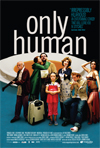THE MERCHANT OF VENICE

THUMBS UP FILM REVIEW RATING!
There are so few truly timeless stories, but Shakespeare’s THE MERCHANT OF VENICE is certainly one of them. So much of what came out of this play still resonates in our society today as to boggle the mind. Words like "Shylock" are still representative of money lenders (see GET SHORTY), and the themes of vengeance, religion, and forgiveness still live on. "If you prick me do I not bleed" is probably the most memorable line in literature, and here we get to see, feel and experience it firsthand in screenwriter and director Michael Radford’s excellent adaptation.
For those who’ve lived under a stone for the past 400 years, The Merchant of Venice is the story of Shylock (Al Pacino, TWO FOR THE MONEY), Antonio (Jeremy Irons, CASANOVA) and Bassanio (Joseph Fiennes, SHAKESPEARE IN LOVE), three men who will be tied together by a bond (i.e., financial agreement). Antonio and Bassanio are great friends who live in Venice during religiously tumultuous times. Both are Christians, but Antonio is man of means, while Bassanio is one who’s flittered away his family’s wealth. Bassanio, now in love with the beautiful heiress Portia (Lynn Collins, THE LAKE HOUSE), must find a way to travel the distant oceans and wed her. Lacking funds, he approaches Antonio, who happens to have all of his moneys tied to ships that remain out to sea but due back with plenty of loot/merchandise, but agrees to extend his own credit so that Bassanio might travel to his true-love’s home. They approach Shylock. He agrees to loan Antonio/Bassanio the funds, but only if Antonio signs a bond that, should he fail to pay it pack in three months, will result in Shylock cleaving "a pound of flesh from nearest Antonio’s heart."
Needless to say, Antonio’s ships never return, thus placing him in dire financial straits and owing his flesh to Shylock. At the forefront of all this are the religious aspects. Jews live in the low-rent areas of Venice and are forced to wear red hats (identifying them as Jews to everyone) whenever out in the general population during the day. At night, they are shut in and not allowed to leave the ghetto. They are often spit upon by Christians, and even Antonio does this, something Shylock does not easily forget. And, to add anger to angst, Shylock’s daughter has run-off with a Christian boy and turned her back on Judaism. So when Antonio fails to pay good on his debt in three months, Shylock demands his just dessert: the flesh.
That this play was written so long ago yet remains at the center of what we continue to fight about really shows Shakespeare’s grasp on humanity.
Radford’s adaptation is beautifully filmed (mostly in Venice itself) using the many cobbled streets and porticos to great advantage. The language is also straight from Shakespeare and not modernized in any way (some may find this difficult to follow but it really gives a sense of the times). For English Lit students, this might make a great cliff notes film to watch.
Al Pacino’s performance shines as Shylock, the vengeful and ultimately pitiable Jewish money lender who’s own unforgiving attitude spells his demise. His commanding presence forces viewers to pay very close attention to every word he speaks. And he speaks them in awesome tones.
It’d be hard to find another Shakespeare adaptation that could stand up to this one. The only one that comes to mind is Shakespeare in Love, but it’s not of the same ilk as this flick. Shakespeare in Love is one of my favorite films. The Merchant of Venice is, too, but for entirely different reasons.















0 Comments:
Post a Comment
<< Home